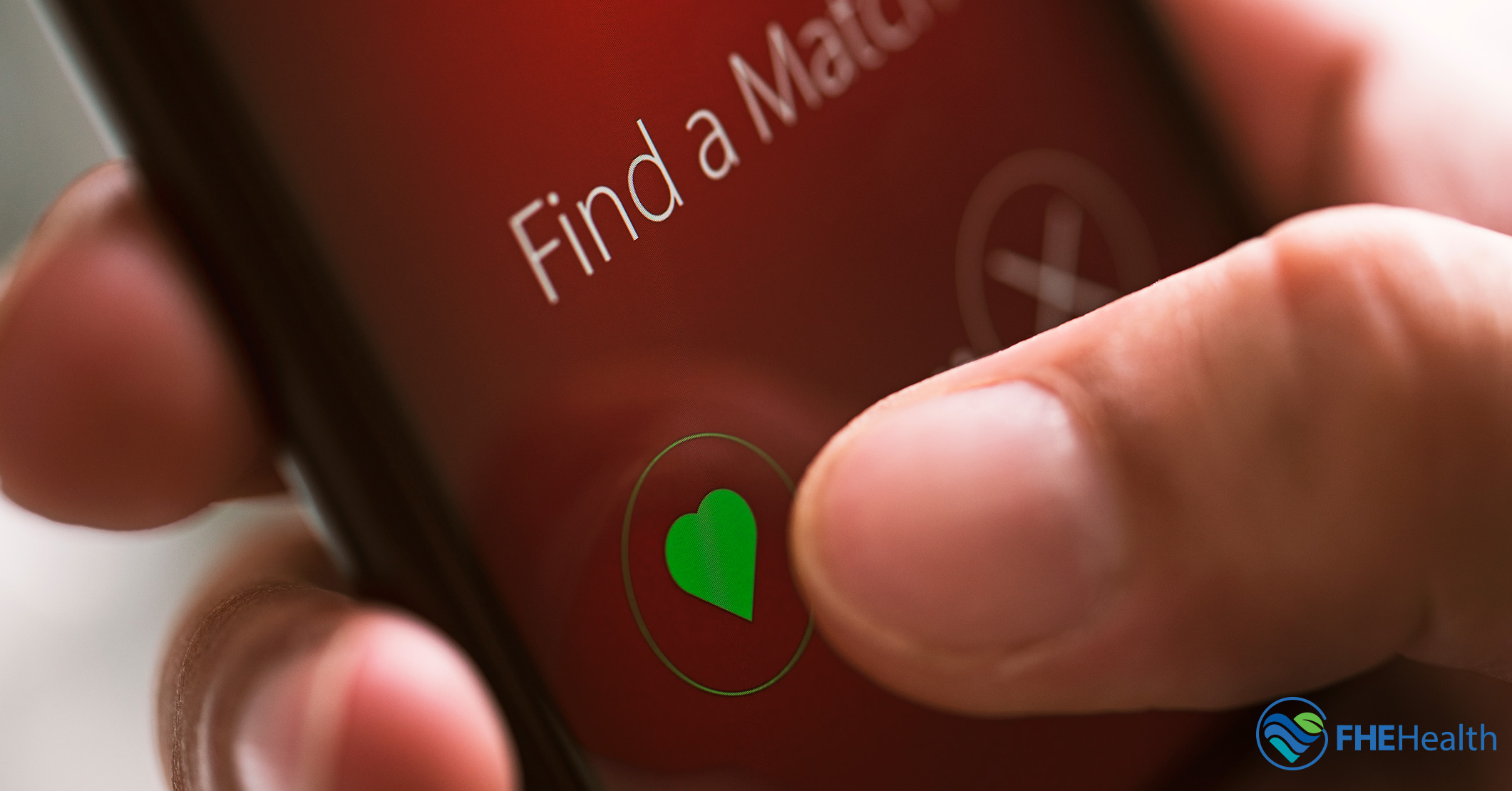
Much has changed since the launch of the very first dating app, Match.com, in 1995. Dating then still largely depended on first meeting someone in person and asking for their number. Today, online dating is the main way to meet people, thanks to a plethora of apps offering more choices and greater convenience than ever before. The result has been that most matches nowadays begin virtually—with a right swipe or comment on a profile, rather than an in-person introduction.
Introduction to the Impact of Online Dating
This drastic evolution in dating norms has had its benefits and drawbacks. Both in terms of potential partners and types of relationships, both men and women have the most options they have had at any time in human history. At the same time, online dating can take a toll and lead to burnout, and these issues are uniquely tied to the use of dating apps. Nearly 80 percent of long-term dating app users said they had experienced emotional burnout or fatigue, according to a June 2022 article in The New York Times. (It was assessing the state of online dating 10 years after the advent of Tinder.)
We wanted to explore this mental health link in greater depth—and specifically, the impact of online dating on mental health. Did dating app use correspond with higher stress and anxiety levels, and if so, in what ways? And, how challenging did survey respondents perceive these issues to be? Finally, how, if at all, did social dynamics influence or mitigate the mental health effects of online dating?
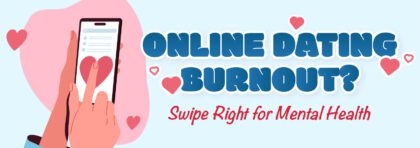
We decided to conduct a survey. The data we gathered was revealing, and what we found will surprise you—first, a brief look at our survey methods and the demographic that took part.
Our Survey and Data Collection Methods
We were able to collect data from 320 self-selected respondents, using Amazon’s Mechanical Turk crowdsourcing service. All our respondents were U.S.-based workers. They were told only that they were participating in market data research for dating app usage and its links to mental health. They also were compensated at the usual worker rate. Each respondent had 30 minutes to complete the survey.
More About Our Survey Respondents
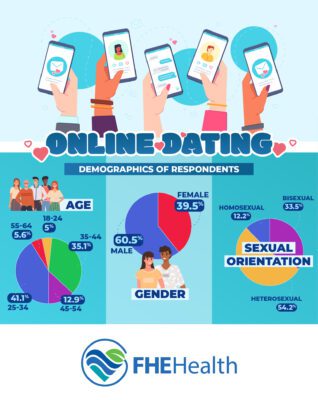
Our survey respondents were adults, men and women, ages 18 and up. Here are some other key characteristics of our survey pool, which could have influenced the results:
- Age and gender: The vast majority were within the age ranges of 25-34 (41.5 percent) and 35-44 (35.4 percent), and there were significantly more male respondents (60.8 percent) than female respondents (39.2 percent).
- Sexual orientation: While roughly half identified as “heterosexual,” 35.8 percent identified as “bisexual,” with the remaining 13.9 percent identifying as “homosexual.”
- Education: Most respondents had either a graduate degree (45.3 percent) or an undergraduate degree (41.8 percent).
- Employment and income: 87.7 percent worked full-time, and salaries mostly tended to be in the 50k-75k range (36.1 percent) and 25k-50k (31.3 percent), followed by 75k-100k (19.9 percent) and less that 25k (7 percent).
Social Dynamics and Online Dating – Latest Data Re: Dating App Trends
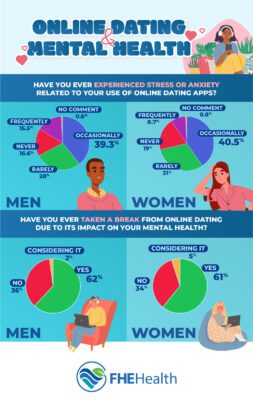
Almost all respondents (96.7 percent) said they were using dating apps when they filled out our survey. How often did they use dating apps—daily, weekly, monthly, or rarely, we asked? 42.7 percent said weekly, 25.3 percent said daily; 19.9 percent said monthly; and 8.9 percent said rarely.
Most respondents (65 percent) said they had not been on dating apps very long: less than a year (32 percent) or less than a month (25.9 percent). Only 15.2 percent said they had been using dating apps for more than two years.
Dating and Relationship Status and Most Used Apps
The next part, dating and relationship status, came as a surprise. It might seem safe to assume that most people using dating apps are single, right? Wrong, according to our survey. 73.4 percent of respondents said they were married. Only 16.1 percent said they were single, and 10.1 percent said they were in a relationship.
What might explain the fact that most respondents were reportedly married and online dating? The prospect of getting paid to complete the survey may have caused respondents to claim falsely that they were currently using online dating apps. That said, marital status could also influence respondents’ answers elsewhere. A married person might be more apt to use certain dating apps over others and have different intentions for dating, for example.
Top 3 Most Popular Dating Apps
What were the top three dating apps? Tinder was by far the most used dating app at 57.9 percent, followed by Bumble at 35.8 percent. OKCupid was the third most popular app (32.9 percent), although Match.com was a close contender (32 percent).
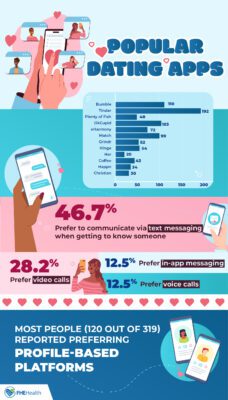
Primary Intent with Online Dating and Level of Honesty About It?
We also wanted to know what people were hoping to get out of online dating. Here, too, the answers were revealing. The #1 primary intent was “casual dating” (49 percent). Did this have anything to do with the fact that most of our respondents were married? Maybe.
Casual dating was followed by “long-term relationships” (22 percent) second, “friendships” (14 percent) third, and fourth, “looking for a fling” (13 percent).
Were people upfront about their intent? Yes, largely so. In fact, people were more likely to say their intent was a fling or casual dating than a long-term relationship or friendship:
- 83.7 percent of people looking for a fling say so
- 80.8 percent of people looking for casual dating say so
- 77.7 percent of people looking for a long-term relationship say so
- 70.2 percent of people looking for friendship say so
Age Preferences When Dating
When we looked at respondents’ age versus what age group they were looking to date, overall, most people in the well-represented age groups sought a partner in their same age group. It was also common to lean younger rather than older.
87.5 percent of women, ages 18-24, and 81 percent of women, ages 25-34, dated within their age group. This trend changed as women grew older: Only 50 percent of women ages 45-54 were still dating within their age range; 42.9 percent were looking for a younger partner in the 35-44-year-old age range.
A similar trend occurred among men, but they were more likely to start dating outside of their age group at a younger age. Like younger women, younger men (ages 18-24 and 25-34) largely dated within their age groups at 87.5 percent and 82.2 percent, respectively. However, as early as 35-44, only 52 percent of men were looking for women in the same age range, and 41 percent were looking for women in the 25-43 age range. Similarly, 33 percent of 45-54-year-old men were looking for 35-44-old women; only 6.7 percent were looking for women in their age group.
Importance of Politics and Religion
Politics and religion are important to a lot of online daters, and religion and spirituality were more important than politics.
- 59 percent said religion/spirituality match was important or very important to them.
- 41 percent said political leanings were important/very important in a potential match.
Mental Health Effects of Online Dating and Navigating Burnout Strategies
When we set out to evaluate the impact of online dating on mental health, we asked respondents a series of questions that might shed light on digital dating challenges and the psychological effects of online dating, such as stress, anxiety, and burnout. Was there a link? Moreover, how did respondents navigate these issues? Again, the answers proved eye-opening.
Digital Dating Challenges
First, we wanted to explore the challenges of digital dating that could affect mental health….
The First Date
Respondents were asked to rate how comfortable they feel on first dates after meeting people online. On a 1-5 scale, “1” meant “extremely uncomfortable,” and “5” meant “extremely comfortable. Not surprisingly, it was very uncommon for respondents to say they feel “extremely comfortable” on a first date. However, a majority (37.7 percent) rated their comfort level as high (a 4 out of 5), and this result was remarkably similar for men and women. This suggests that the first date is less of a challenge than it can sometimes be construed.
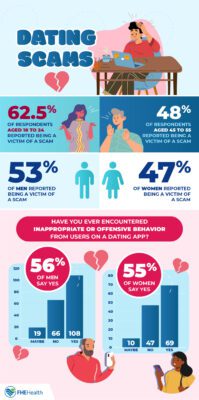
Safety of Dating Apps
How safe do people feel when using dating apps? About one in two people (52.3 percent) said a dating app had put them in a position where they felt unsafe. That proportion went up significantly when the respondent was homosexual (84 percent) or bisexual (65 percent).
Significantly, 51 percent of respondents said they had been a victim of a scam on a dating site, with males reporting this experience at a slightly higher rate of 53.3 percent.
Other Online Dating Stressors
When we asked about other online dating stressors:
- 55 percent said they had encountered inappropriate or offensive behavior on a dating app.
- 65 percent said they had to block someone on an app before, but interestingly, just 31 percent of the youngest group (ages 18-24) reported having to block someone on an app.
- 55 percent reported feeling pressured to share personal info or photos or engage in activities they were uncomfortable with while using a dating app.
How Common Were Experiences of Catfishing?
While experiences of catfishing were very common, encountering fake profiles happened more often to men (65 percent) than women (57 percent).
Psychological Effects of Online Dating
How often did respondents experience stress and anxiety from their use of dating apps? 16.9 said frequently, and 39.8 percent said occasionally. Interestingly, 16.5 percent of men reported “never” experiencing stress and anxiety. This was nearly double the percentage of women who said the same thing (8.7 percent).
Pressures to Conform and Emphasis on Appearance?
On the question of whether dating apps have made them feel pressure to conform to certain physical or lifestyle standards promoted on the app, hetero reporting respondents said never or rarely at 47 percent, compared to bisexual reporting at 27 percent and homosexual at 28 percent.
When asked if the emphasis on appearance or physical attraction in online dating had affected their mental health, 36.4 percent said slightly, 31.7 percent said moderately, and 13.8 percent said significantly. Interestingly, 12 percent of the 18-24-year-old cohort said the emphasis on appearance and physical attraction had improved their mental well-being.
Influence on Self-Esteem
When asked to what extent dating apps had influenced their self-esteem:
- 14.6 percent said very positively, and 38.6 percent said slightly positively.
- 15.5 percent said slightly negatively, and 8.9 percent said very negatively.
- 23.1 percent said they had noticed no effect on self-esteem.
Coping with Online Dating Stress – Taking a Break for Mental Health
How many people had to take a break from online dating due to its impact on their mental health? A whopping 61.4 percent said they’d had to take a break for the sake of their mental health, and these numbers were very similar for male and female respondents.
This trend was not reflected among the youngest group of online daters, those in the 18-24-year-old bracket. In fact, almost the reverse was true: 68.7 percent said they had never taken a break for mental health reasons.
Feelings of Loneliness and Isolation
Once again, our respondents’ answers verified that online dating takes a toll on mental health. When asked to what extent online dating had contributed to feelings of loneliness and isolation, only 12.9 percent said not at all. 41 percent said moderately. 23 percent said significantly. Those in the 25-34 age range stood out when 34 percent of them said online dating significantly contributed to feelings of loneliness and isolation.
Balancing Online Dating and Mental Well-Being
Evidently, the use of dating apps took a mental health toll in multiple ways. What was more surprising was that these repercussions largely did not seem to influence dating behaviors, starting with how respondents rated the apps:
- Those who said they “frequently” experienced stress or anxiety related to dating apps also rated their overall experience the highest: 5 out of 5 (on a scale of 1-5).
- 77 percent said they would still recommend online dating to others. Casual daters recommended it the most.
- (Notably, 31.3 percent of those in the 18-24 age group said they would not recommend online dating, in contrast to the overall 15.36 percent that said they would not recommend it.)
- Even among those who reported that an app had compromised their sense of safety, this factor did not have a major effect on overall positive ratings.
Which groups were least likely to recommend using dating apps? Those making under $25k a year, those who reported they had only had one relationship or “N/A” from dating apps, and those with the intent of a long-term relationship were least likely to recommend dating apps.
Challenges Addressing Increased Stress and Anxiety
In summary, our survey data confirmed that online dating does indeed take a mental health toll in various ways. Users seemed to be saying, “Yes, we’ve had bad experiences.” At the same time, they also seemed to be saying, “We’d still recommend dating apps.”
What inferences might be made from these results? One might be that online daters have adequate resources to address and manage the challenges of increased stress and anxiety. For example, online dating was a common topic in therapy, with 54.1 percent of those with therapists saying they talked about the issue. Addressing online dating in therapy could help to offset or relieve the negative mental health impact.
Another explanation might be that online dating has had positive mental health effects that mitigate the negative mental health effects. 57.6 percent said online dating had positively impacted their social life outside of the app. A more active social life could signify more social support during difficult dating periods and is also one of the most effective buffers against common mental health issues.
Finally, intention on dating apps seems to be a decisive factor in a discussion of the mental health impact of online dating. Our results suggest that dating apps may work better for those whose aim is casual dating.






